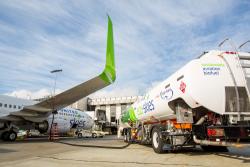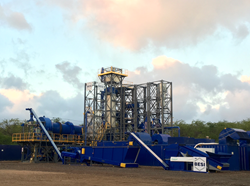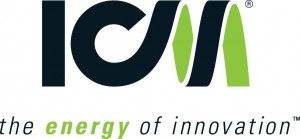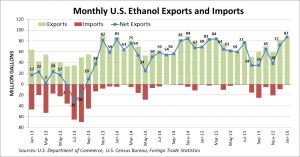Aviation history has been made. United Airlines has become the first U.S. airline to begin regularly flying with sustainable aviation biofuel. The first flight (708) will take off from Los Angelos International Airport (LAX).
 As part of this new business initiative, United will purchase up to 15 million gallons of biojet fuel from AltAir Paramount over three years. AltAir is currently pursuing certification under the Renewable of Sustainable Biofuels (RSB) and their facility is the first dedicated, commercial-scale renewable jet fuel production facility in the world. The company produces renewable diesel from non-edible natural oils and agricultural wastes.
As part of this new business initiative, United will purchase up to 15 million gallons of biojet fuel from AltAir Paramount over three years. AltAir is currently pursuing certification under the Renewable of Sustainable Biofuels (RSB) and their facility is the first dedicated, commercial-scale renewable jet fuel production facility in the world. The company produces renewable diesel from non-edible natural oils and agricultural wastes.
“Today’s historic launch of regularly scheduled service utilizing advanced biofuels represents a major next step in our ongoing commitment to operate sustainably and responsibly,” said Angela Foster-Rice, United’s managing director of environmental affairs and sustainability. “United is a leader in the advancement of alternative fuels, and, along with our partners at AltAir Paramount, we are taking action every day to minimize our impact on the environment and explore new ways to improve efficiency.”
United has begun using the biojet fuel in its daily operations at LAX and is able to store and deliver the fuel the same as traditional fuel. For two weeks, the airline will operate flights between LAX and San Francisco using AltAir’s renewable fuel.
Los Angeles Mayor Eric Garcetti, said of the historic announcement, “Los Angeles is a global leader in sustainability, so it’s no wonder that the first U.S. flights to use commercial-scale, renewable jet fuel are taking off from our airport. LAX and United Airlines have broken new ground with fuel that reduces carbon emissions by as much as 60 percent when compared to standard jet fuel. Today, we set a new standard for sustainability in aviation — an example I hope the rest of the industry will follow in the coming years.”











